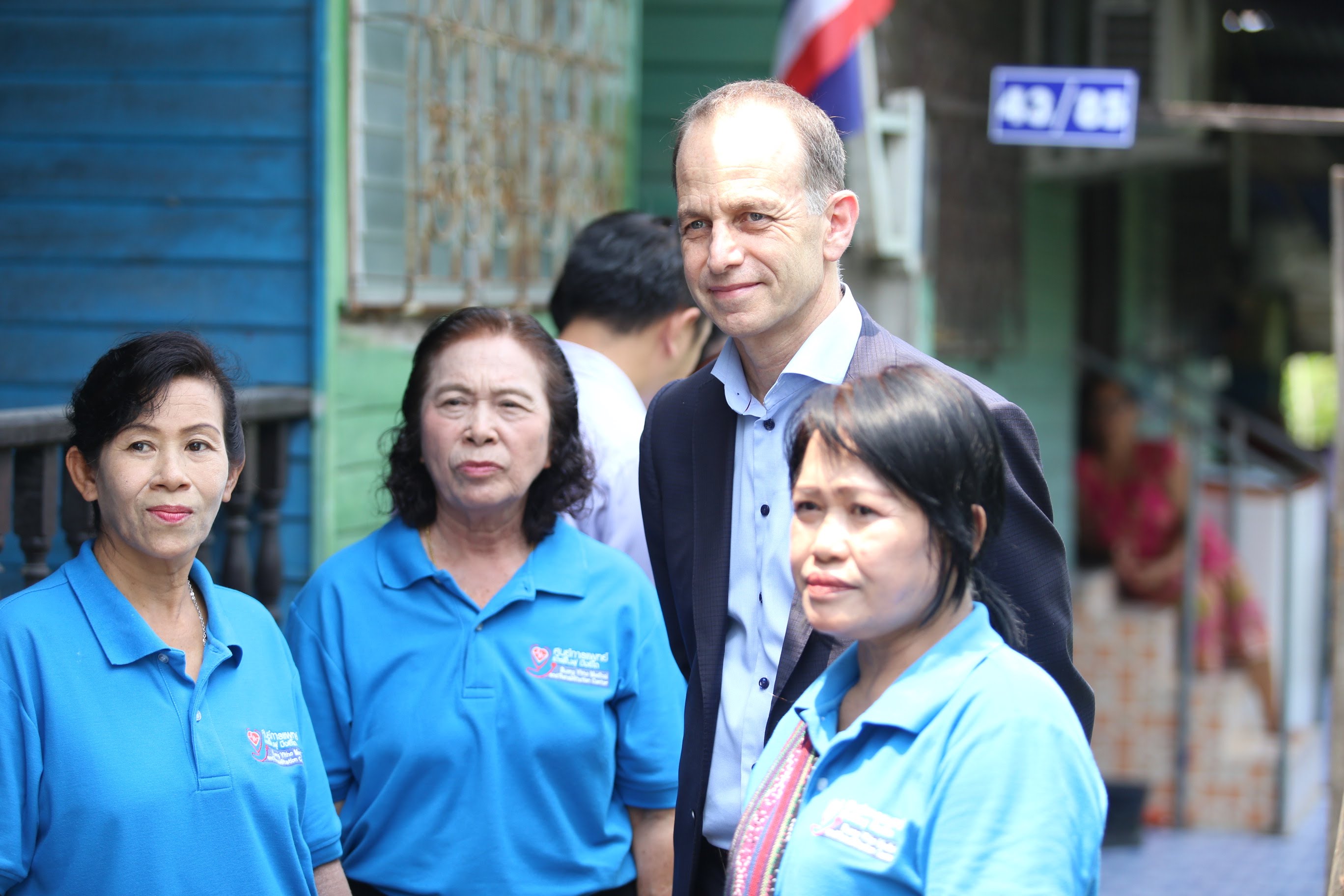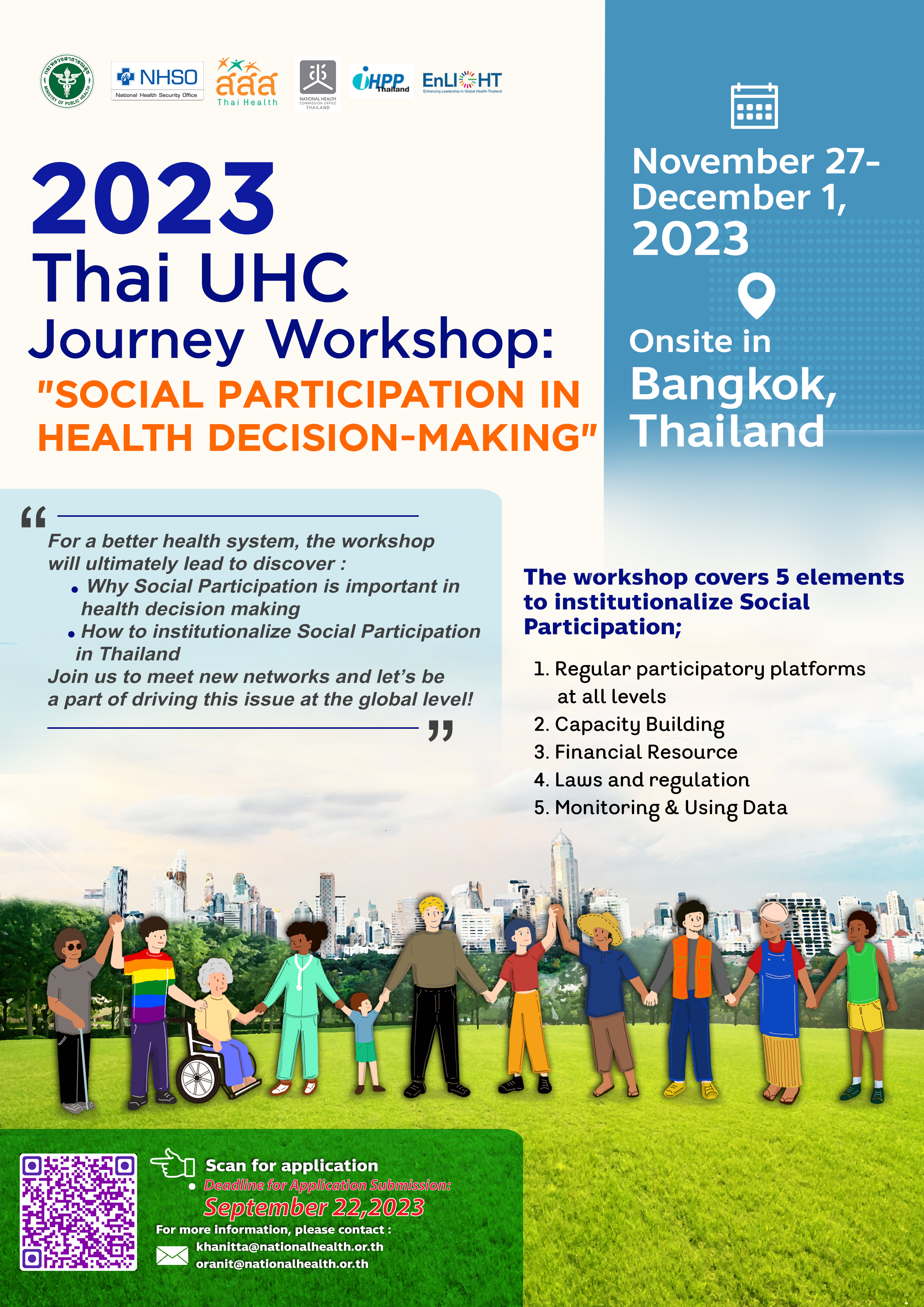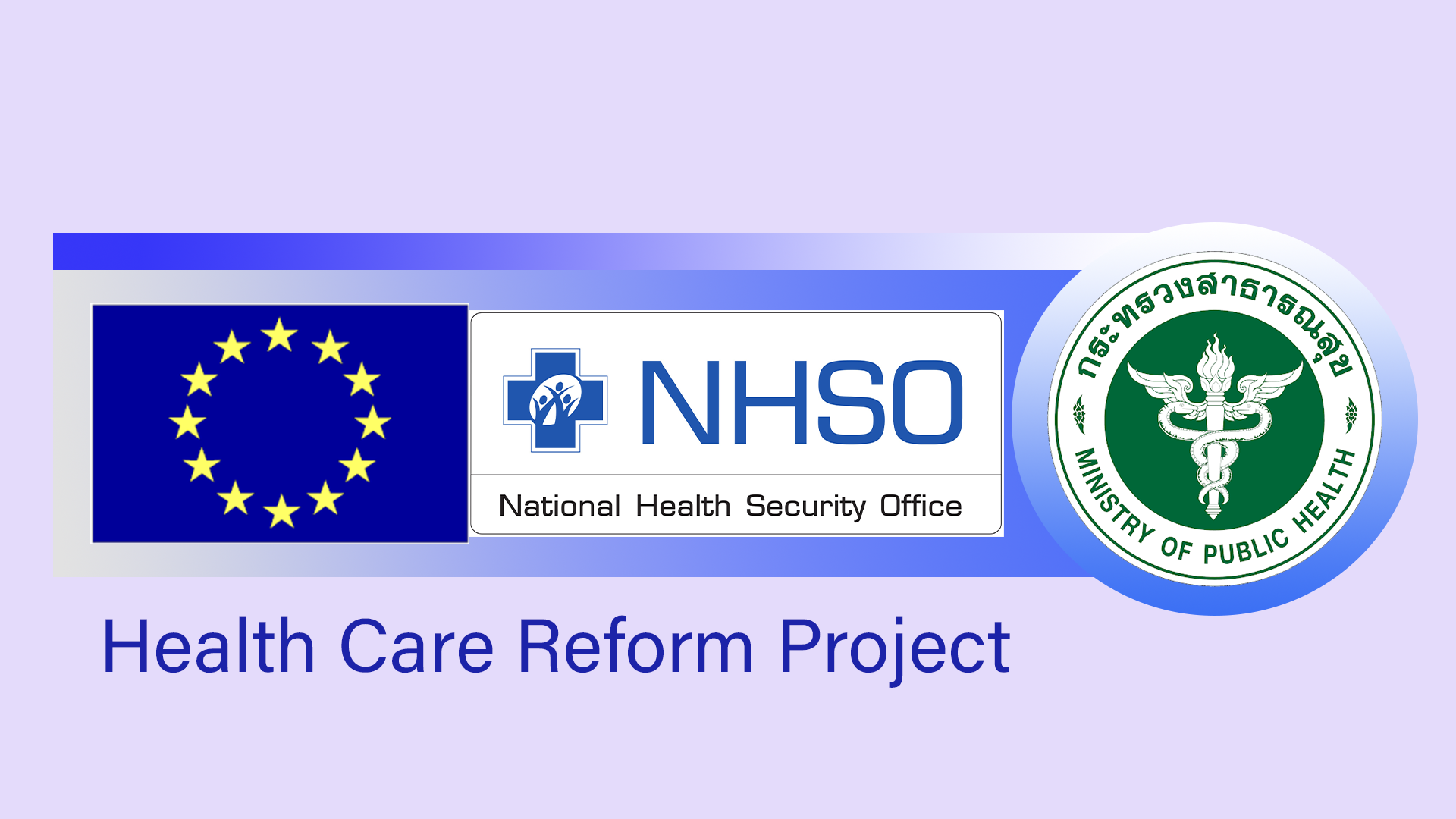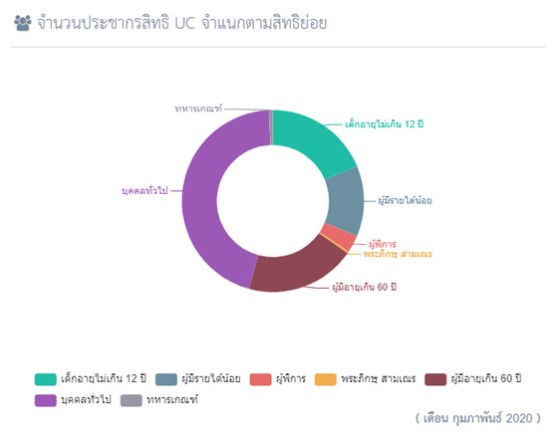Thai Strong Healthcare scheme makes the pandemic under control
 An exclusive interview with WHO Representative to Thailand Dr.Daniel Kertesz
An exclusive interview with WHO Representative to Thailand Dr.Daniel KerteszWorld Health Organization identifying Thailand's Response to curb infections as a “Success Story” in dealing with the COVID-19 pandemic. During the crisis, the Thai Health system spent only a month in “Flattening the Curve” and went through the pandemic, easing lockdown and start the normal life again.
As a WHO Representative to Thailand, Dr.Daniel Kertesz pinpointing that the Thai Healthcare System from the past is a main key factor behind the success story.
“A strong primary care and a Universal Health Coverage are (UHC) the two main factors, you cannot develop the UHC and good primary healthcare in the middle of the pandemic,” Kertesz said
In Thailand, it took 40 years of political commitment, Investment, and commitment to excellence, improvement, and innovation to built up such a system that made Thailand had an outstanding outcome in health.
Another thing Kertesz mentioned is a capability of Thailand to built an evidence-based health policy from an institution such as HITAP (Health Intervention and Technology Assessment Program), HSRI (Health System Research Institute), and NHSO (National Health Security Office) which generating a policy independently, not to relying on other countries approach.
WHO Representative to Thailand also stated that “Champions” of the system such as the staff of district health promotion hospital and the village health volunteer who made the health system very strong.
“Motivation that they provided, the respect that they have has allowed the advanced in policy in Thai Public Health, and also securing the political commitment for public health policy”
Another thing Daniel stated is the “relationship” between the Health Workers from doctors, Nurse and the patients in Thailand is very close. Whether at the community health center or a large hospital. This relationship leads to “Trust” which results in the continuous development of Thai hospital in several decades
In terms of Global Health Agenda, Kertesz said Thailand was a leader for a very long time, the progressive policy to tackle non-communicable diseases on Lifestyle or on Health Promotion to prevent diseases such as diabetes, High Blood Pressure made Thailand as a World Leader for these areas.
“In the area of UHC and global health diplomacy, Thailand is a very important actor on the global stage, they understand what global health diplomacy is and understand the power of the leverage on the world stage, not only in WHO but in the United Nations also,” said Kertesz
Before the pandemic, Kertesz praised Thailand as a leader of the global health agenda on Universal Health Coverage, as Thai Health System accomplished on this scheme since 2001.
Last year, Permanent Representative of Thailand to the United Nations and Permanent Representative of Georgia to the United Nations play a critical role of presenting the Political Declaration of the High-level Meeting on Universal Health Coverage “Universal health coverage: moving together to build a healthier world” at the United Nations Headquarters to promote both UHC and quality primary healtcare.
As WHO Representative to Thailand, Kertesz insists that UHC and also the primary healthcare still represent a vital role of global health agenda from before and during the pandemic.
“You cannot respond to the pandemic effectively unless you have excellent primary healthcare and UHC. Because if the patient has to pay for the health services, they won’t have trust in the health system” Said Kertesz
UHC also responds in a critical role in destroying the barrier between the patient and health service, because if patient need to pay to “access” the healthcare, they will not trust the system. As a result, they will be left the system and made it more difficult for the government to control the pandemic.
He also hopes that the significant lessons in every country are to build a strong health system to prepare for the worst pandemic that countries might face again
But the challenge lies ahead, the COVID-19 not damaged only health issues but also hurt the economy. The government will have to decide what to invest after this between restore the economy or invest in an issue such as the UHC.
Kertesz hopes the important lesson for Each country is to build a strong health system before the pandemic started.
If the pandemic meant countries need to “Tested”, “Isolated” and “Treated” that means countries need a strong facility, strong Health Workforce, and Strong System to tackling the pandemic.
Another thing is that in the post-COVID-19 time, each government still needs to face other diseases. Hospitals, the public health service system must provide regular health services. UHC and Primary Healthcare with other Excellence Health Service with a reasonable price will still be an issue for a better world.

IN DEPTH
Thai Strong Healthcare scheme makes the pandemic under control
 An exclusive interview with WHO Representative to Thailand Dr.Daniel Kertesz
An exclusive interview with WHO Representative to Thailand Dr.Daniel KerteszWorld Health Organization identifying Thailand's Response to curb infections as a “Success Story” in dealing with the COVID-19 pandemic. During the crisis, the Thai Health system spent only a month in “Flattening the Curve” and went through the pandemic, easing lockdown and start the normal life again.
As a WHO Representative to Thailand, Dr.Daniel Kertesz pinpointing that the Thai Healthcare System from the past is a main key factor behind the success story.
“A strong primary care and a Universal Health Coverage are (UHC) the two main factors, you cannot develop the UHC and good primary healthcare in the middle of the pandemic,” Kertesz said
In Thailand, it took 40 years of political commitment, Investment, and commitment to excellence, improvement, and innovation to built up such a system that made Thailand had an outstanding outcome in health.
Another thing Kertesz mentioned is a capability of Thailand to built an evidence-based health policy from an institution such as HITAP (Health Intervention and Technology Assessment Program), HSRI (Health System Research Institute), and NHSO (National Health Security Office) which generating a policy independently, not to relying on other countries approach.
WHO Representative to Thailand also stated that “Champions” of the system such as the staff of district health promotion hospital and the village health volunteer who made the health system very strong.
“Motivation that they provided, the respect that they have has allowed the advanced in policy in Thai Public Health, and also securing the political commitment for public health policy”
Another thing Daniel stated is the “relationship” between the Health Workers from doctors, Nurse and the patients in Thailand is very close. Whether at the community health center or a large hospital. This relationship leads to “Trust” which results in the continuous development of Thai hospital in several decades
In terms of Global Health Agenda, Kertesz said Thailand was a leader for a very long time, the progressive policy to tackle non-communicable diseases on Lifestyle or on Health Promotion to prevent diseases such as diabetes, High Blood Pressure made Thailand as a World Leader for these areas.
“In the area of UHC and global health diplomacy, Thailand is a very important actor on the global stage, they understand what global health diplomacy is and understand the power of the leverage on the world stage, not only in WHO but in the United Nations also,” said Kertesz
Before the pandemic, Kertesz praised Thailand as a leader of the global health agenda on Universal Health Coverage, as Thai Health System accomplished on this scheme since 2001.
Last year, Permanent Representative of Thailand to the United Nations and Permanent Representative of Georgia to the United Nations play a critical role of presenting the Political Declaration of the High-level Meeting on Universal Health Coverage “Universal health coverage: moving together to build a healthier world” at the United Nations Headquarters to promote both UHC and quality primary healtcare.
As WHO Representative to Thailand, Kertesz insists that UHC and also the primary healthcare still represent a vital role of global health agenda from before and during the pandemic.
“You cannot respond to the pandemic effectively unless you have excellent primary healthcare and UHC. Because if the patient has to pay for the health services, they won’t have trust in the health system” Said Kertesz
UHC also responds in a critical role in destroying the barrier between the patient and health service, because if patient need to pay to “access” the healthcare, they will not trust the system. As a result, they will be left the system and made it more difficult for the government to control the pandemic.
He also hopes that the significant lessons in every country are to build a strong health system to prepare for the worst pandemic that countries might face again
But the challenge lies ahead, the COVID-19 not damaged only health issues but also hurt the economy. The government will have to decide what to invest after this between restore the economy or invest in an issue such as the UHC.
Kertesz hopes the important lesson for Each country is to build a strong health system before the pandemic started.
If the pandemic meant countries need to “Tested”, “Isolated” and “Treated” that means countries need a strong facility, strong Health Workforce, and Strong System to tackling the pandemic.
Another thing is that in the post-COVID-19 time, each government still needs to face other diseases. Hospitals, the public health service system must provide regular health services. UHC and Primary Healthcare with other Excellence Health Service with a reasonable price will still be an issue for a better world.

Events
Thai Strong Healthcare scheme makes the pandemic under control
 An exclusive interview with WHO Representative to Thailand Dr.Daniel Kertesz
An exclusive interview with WHO Representative to Thailand Dr.Daniel KerteszWorld Health Organization identifying Thailand's Response to curb infections as a “Success Story” in dealing with the COVID-19 pandemic. During the crisis, the Thai Health system spent only a month in “Flattening the Curve” and went through the pandemic, easing lockdown and start the normal life again.
As a WHO Representative to Thailand, Dr.Daniel Kertesz pinpointing that the Thai Healthcare System from the past is a main key factor behind the success story.
“A strong primary care and a Universal Health Coverage are (UHC) the two main factors, you cannot develop the UHC and good primary healthcare in the middle of the pandemic,” Kertesz said
In Thailand, it took 40 years of political commitment, Investment, and commitment to excellence, improvement, and innovation to built up such a system that made Thailand had an outstanding outcome in health.
Another thing Kertesz mentioned is a capability of Thailand to built an evidence-based health policy from an institution such as HITAP (Health Intervention and Technology Assessment Program), HSRI (Health System Research Institute), and NHSO (National Health Security Office) which generating a policy independently, not to relying on other countries approach.
WHO Representative to Thailand also stated that “Champions” of the system such as the staff of district health promotion hospital and the village health volunteer who made the health system very strong.
“Motivation that they provided, the respect that they have has allowed the advanced in policy in Thai Public Health, and also securing the political commitment for public health policy”
Another thing Daniel stated is the “relationship” between the Health Workers from doctors, Nurse and the patients in Thailand is very close. Whether at the community health center or a large hospital. This relationship leads to “Trust” which results in the continuous development of Thai hospital in several decades
In terms of Global Health Agenda, Kertesz said Thailand was a leader for a very long time, the progressive policy to tackle non-communicable diseases on Lifestyle or on Health Promotion to prevent diseases such as diabetes, High Blood Pressure made Thailand as a World Leader for these areas.
“In the area of UHC and global health diplomacy, Thailand is a very important actor on the global stage, they understand what global health diplomacy is and understand the power of the leverage on the world stage, not only in WHO but in the United Nations also,” said Kertesz
Before the pandemic, Kertesz praised Thailand as a leader of the global health agenda on Universal Health Coverage, as Thai Health System accomplished on this scheme since 2001.
Last year, Permanent Representative of Thailand to the United Nations and Permanent Representative of Georgia to the United Nations play a critical role of presenting the Political Declaration of the High-level Meeting on Universal Health Coverage “Universal health coverage: moving together to build a healthier world” at the United Nations Headquarters to promote both UHC and quality primary healtcare.
As WHO Representative to Thailand, Kertesz insists that UHC and also the primary healthcare still represent a vital role of global health agenda from before and during the pandemic.
“You cannot respond to the pandemic effectively unless you have excellent primary healthcare and UHC. Because if the patient has to pay for the health services, they won’t have trust in the health system” Said Kertesz
UHC also responds in a critical role in destroying the barrier between the patient and health service, because if patient need to pay to “access” the healthcare, they will not trust the system. As a result, they will be left the system and made it more difficult for the government to control the pandemic.
He also hopes that the significant lessons in every country are to build a strong health system to prepare for the worst pandemic that countries might face again
But the challenge lies ahead, the COVID-19 not damaged only health issues but also hurt the economy. The government will have to decide what to invest after this between restore the economy or invest in an issue such as the UHC.
Kertesz hopes the important lesson for Each country is to build a strong health system before the pandemic started.
If the pandemic meant countries need to “Tested”, “Isolated” and “Treated” that means countries need a strong facility, strong Health Workforce, and Strong System to tackling the pandemic.
Another thing is that in the post-COVID-19 time, each government still needs to face other diseases. Hospitals, the public health service system must provide regular health services. UHC and Primary Healthcare with other Excellence Health Service with a reasonable price will still be an issue for a better world.

RESOURCE CENTER
SECRETARY-GENERAL
Thai Strong Healthcare scheme makes the pandemic under control
 An exclusive interview with WHO Representative to Thailand Dr.Daniel Kertesz
An exclusive interview with WHO Representative to Thailand Dr.Daniel KerteszWorld Health Organization identifying Thailand's Response to curb infections as a “Success Story” in dealing with the COVID-19 pandemic. During the crisis, the Thai Health system spent only a month in “Flattening the Curve” and went through the pandemic, easing lockdown and start the normal life again.
As a WHO Representative to Thailand, Dr.Daniel Kertesz pinpointing that the Thai Healthcare System from the past is a main key factor behind the success story.
“A strong primary care and a Universal Health Coverage are (UHC) the two main factors, you cannot develop the UHC and good primary healthcare in the middle of the pandemic,” Kertesz said
In Thailand, it took 40 years of political commitment, Investment, and commitment to excellence, improvement, and innovation to built up such a system that made Thailand had an outstanding outcome in health.
Another thing Kertesz mentioned is a capability of Thailand to built an evidence-based health policy from an institution such as HITAP (Health Intervention and Technology Assessment Program), HSRI (Health System Research Institute), and NHSO (National Health Security Office) which generating a policy independently, not to relying on other countries approach.
WHO Representative to Thailand also stated that “Champions” of the system such as the staff of district health promotion hospital and the village health volunteer who made the health system very strong.
“Motivation that they provided, the respect that they have has allowed the advanced in policy in Thai Public Health, and also securing the political commitment for public health policy”
Another thing Daniel stated is the “relationship” between the Health Workers from doctors, Nurse and the patients in Thailand is very close. Whether at the community health center or a large hospital. This relationship leads to “Trust” which results in the continuous development of Thai hospital in several decades
In terms of Global Health Agenda, Kertesz said Thailand was a leader for a very long time, the progressive policy to tackle non-communicable diseases on Lifestyle or on Health Promotion to prevent diseases such as diabetes, High Blood Pressure made Thailand as a World Leader for these areas.
“In the area of UHC and global health diplomacy, Thailand is a very important actor on the global stage, they understand what global health diplomacy is and understand the power of the leverage on the world stage, not only in WHO but in the United Nations also,” said Kertesz
Before the pandemic, Kertesz praised Thailand as a leader of the global health agenda on Universal Health Coverage, as Thai Health System accomplished on this scheme since 2001.
Last year, Permanent Representative of Thailand to the United Nations and Permanent Representative of Georgia to the United Nations play a critical role of presenting the Political Declaration of the High-level Meeting on Universal Health Coverage “Universal health coverage: moving together to build a healthier world” at the United Nations Headquarters to promote both UHC and quality primary healtcare.
As WHO Representative to Thailand, Kertesz insists that UHC and also the primary healthcare still represent a vital role of global health agenda from before and during the pandemic.
“You cannot respond to the pandemic effectively unless you have excellent primary healthcare and UHC. Because if the patient has to pay for the health services, they won’t have trust in the health system” Said Kertesz
UHC also responds in a critical role in destroying the barrier between the patient and health service, because if patient need to pay to “access” the healthcare, they will not trust the system. As a result, they will be left the system and made it more difficult for the government to control the pandemic.
He also hopes that the significant lessons in every country are to build a strong health system to prepare for the worst pandemic that countries might face again
But the challenge lies ahead, the COVID-19 not damaged only health issues but also hurt the economy. The government will have to decide what to invest after this between restore the economy or invest in an issue such as the UHC.
Kertesz hopes the important lesson for Each country is to build a strong health system before the pandemic started.
If the pandemic meant countries need to “Tested”, “Isolated” and “Treated” that means countries need a strong facility, strong Health Workforce, and Strong System to tackling the pandemic.
Another thing is that in the post-COVID-19 time, each government still needs to face other diseases. Hospitals, the public health service system must provide regular health services. UHC and Primary Healthcare with other Excellence Health Service with a reasonable price will still be an issue for a better world.

VIDEOS
Thailand's UHC Journey
UHC Public relations












